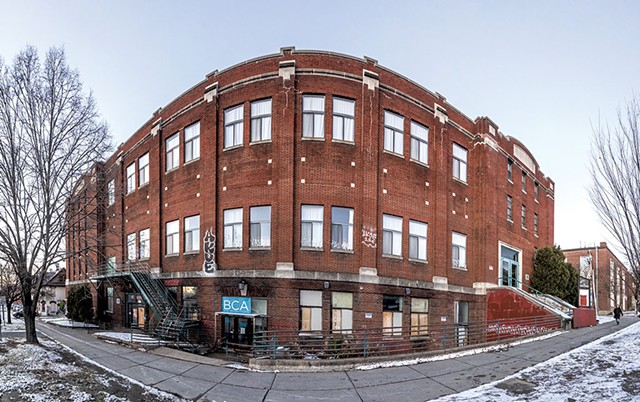
- File: Luke Awtry
- Memorial Auditorium
Officials from the city's Community & Economic Development Office estimate that the repairs needed to keep the building standing would use about $700,000 of the voter-approved funds. Demolishing the structure would have cost $3.35 million, according to the city's most recent estimates. Councilors will vote on a contract for the stabilization work later this summer.
Mayor Miro Weinberger said the council made the right decision.
"This administration has never supported the demolition of Memorial," he said. "Having the updated demolition figures I think does clarify what our option is at this point: stabilization or spending millions more to have an empty site."
Related The History and Uncertain Future of Burlington’s Memorial Auditorium

The council had mixed responses to how the city should proceed. Councilors Joan Shannon (D-South District) and Gene Bergman (P-Ward 2) said the city should review a robust community survey from 2018 for direction on how to reuse the site.
Related Survey Says: Burlingtonians Want to Renovate, Restore Memorial Auditorium
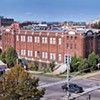
"People have spoken so many times," he said. "Maybe we have to listen here."
Councilor Zoraya Hightower (P-Ward 1) agreed that the city should learn more about the school's plans before committing to any redevelopment but said to be a "truly public resource," Memorial needs an investment of taxpayer dollars.
"To truly be a public-private partnership where we have enough stake to be able to negotiate on what we want, I think we are gonna have to put up some money," she said.
The project is part of the city's "Great Streets" program that aims to create friendlier roadways for walkers and cyclists by building wider sidewalks, tree belts and pedestrian amenities such as benches and swings. Six blocks of Main Street, from South Union to Battery, will get such a makeover.
Related Burlington Seeks a Makeover for Main Street With TIF Bond
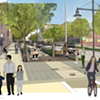
They've also heard from business owners worried about losing parking spots when they're converted from diagonal to parallel, and vowed to perform a parking study — including an inventory of spaces — over the next year.
Earlier in the meeting, the council's second go-around at redistricting ended with little consensus on how to redraw the city's voting districts.
Even after an hour-long work session on the matter, the answers to several key questions still eluded councilors: How many wards should the city have? How should the New North End be divided? And how to distribute the city's college student population?
Related Burlington’s Redistricting Process Has Barely Begun, but Conflict Is Already Brewing

Since 2015, the city has been divided into eight wards and four districts — North, South, East and Central — for a total of 12 councilors. Each district is composed of two wards, so residents have two elected officials: a councilor from their ward and another that represents their geographical district.
But because some areas of the city have grown faster than others, the present-day boundaries don't pass constitutional muster. Councilors must decide on a new map this summer where the population of each district is no more than 10 percent larger or smaller than another. Voters would consider the configuration on the November ballot, and the new maps would take effect in 2024.
Last month, councilors directed the city's mapping specialist, Nancy Stetson, to draw maps using seven, eight and 12 wards, all of which keep the Old North End distinct from the New North End. But the ask was a tough one. Stetson told councilors that it's not possible to create seven wards without having the New North End cannibalize a portion of the Old North End and stay within the 10 percent deviation rule.
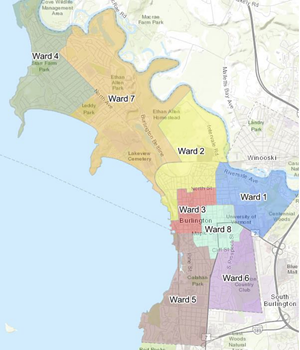
- City of Burlington
- A possible eight-ward configuration
The University of Vermont campus presented other complications. Stetson said that like the 2010 Census, the 2020 version didn't accurately represent the true number of students in certain areas of the city. One block reportedly has more students than the known number of beds, whereas other blocks has far fewer students than the city would expect, Stetson said, adding that the city has since received data that will help update the maps.
The data is key to achieving another of the council's objectives: splitting up the college population into more than one ward. The present-day Ward 8 — an area that includes student-heavy neighborhoods downtown, the University of Vermont's residential campus and University Heights — is nearly all college students, which has generated complaints from long-term residents who say that students have outsize influence in city elections.
Two of Stetson's maps — the seven-ward plan and one of the two eight-ward configurations — seemingly solve the problem by moving a larger chunk of campus into Ward 6. But the two others were problematic: The other eight-ward drawing was essentially the status quo — and was panned by councilors — and the 12-ward map shows that one of those wards would also be a majority students.
Related Control of the Burlington City Council Likely Hinges on One Race: Ward 8
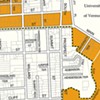
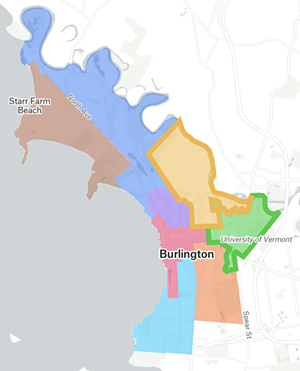
- Chris Haessly
- A proposal from a citizen mapping group
"I am concerned about the options that sort of pull part of the Old North End into the New North End or have part of the Old North End combined with parts of the Hill Section in downtown," Magee said. "I think it would be important for us to maintain that neighborhood integrity."
Councilor Shannon suggested the city work with the mapping group, or at least invite them to present their concepts at a future council meeting — a request Council President Karen Paul (D-Ward 6) took to heart. The council will host a community forum in early June, with the goal of voting on a new concept by July 18.
"I appreciate how difficult it is to make the numbers work," Shannon said. "We're all going to have to make some compromises on the various things that we want."
Later in the meeting, councilors voted to hold off on a proposal meant to prevent short-term rentals from being permitted under regulations for traditional bed and breakfasts.
The city has permitted short-term rentals — leased on sites such as Airbnb and Vrbo — under bed and breakfast rules for years. But a recent effort to limit short-term rentals to a host's permanent residence has influenced people to seek approval under the more permissive regulations for B&Bs. The permit applications have "come in ... at a rapid rate," the council's resolution says.
Related Weinberger Vetoes Burlington's Short-Term Rental Regulations

But some councilors found the language confusing, and questioned whether the plan would really achieve its stated goal — particularly when a council committee is due to report back on a new set of regulations in early June.
The body voted 8-4 to table the issue. Councilors Bergman and Shannon, the resolution's cosponsors, voted no, along with Councilors Ali House (P-Ward 8) and Perri Freeman (P-Central District).
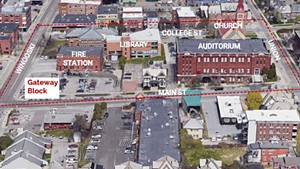

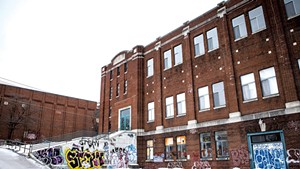











Comments
Comments are closed.
From 2014-2020, Seven Days allowed readers to comment on all stories posted on our website. While we've appreciated the suggestions and insights, right now Seven Days is prioritizing our core mission — producing high-quality, responsible local journalism — over moderating online debates between readers.
To criticize, correct or praise our reporting, please send us a letter to the editor or send us a tip. We’ll check it out and report the results.
Online comments may return when we have better tech tools for managing them. Thanks for reading.